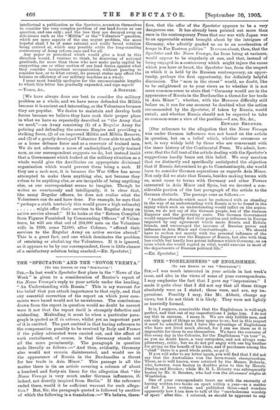SIR,—In last week's Spectator first place in the " News
of the Week " is given to a consideration of Reuter's report of the Novoe Vreritya's reply to your article under the heading, " An Understanding with Russia." This is my warrant for the belief that you attach importance to that reply, and that any essential correction of the report on which your com- ments were based would not be unwelcome. The conclusions drawn from the report in question would no doubt be correct were it not that the report itself is strangely defective and misleading. Misleading it must be when a particular para- graph is quoted as if in extenso, whilst yet an important part of it is omitted. The part omitted is that having reference to the compensation possibly to be received by Italy and France if the policy advocated were carried out, and the effect of such curtailment, of course, is that Germany stands out all the more prominently. The paragraph in question ends literally as follows :—" And then, evidently, Germany also would not remain disinterested, and would see in the appearance of Russia in the Dardanelles a threat for her trade in Asia Minor." This passage is all the matter there is (in an article covering a column of about a hundred and forty-six lines) for the allegation that " the Novoe Vremya is very much under German influences, if, indeed, not directly inspired from Berlin." If the reference ended there, would it be sufficient warrant for such allega- tion ? But, Sir, the paragraph quoted is followed by another of which the following is a translation :---" We believe, there-
dangerous one. It has already been pointed out more than once in the contemporary Press that our war with Japan was
to an appreciable extent brought about by the intrigues of Germany, who adroitly goaded us on to an acceleration of tempo in Far Eastern politics." It comes about, then, that the Spectator and the Novoe Vremya, far from being at variance,
would appear to be singularly at one, and that, instead of being engaged in a controversy which might injure the cause
which you have at heart, the Spectator has, from the respect in which it is held by its Russian contemporary, an oppor- tunity, perhaps the first opportunity, for definitely helpful discussion. The "man in the street" would, no doubt, like to be enlightened as to your views as to whether it is not mere common-sense to state that " Germany would see in the appearance of Russia in the Dardanelles a threat for her trade in Asia Minor "; whether, with the Morocco difficulty still before us, it can for one moment be doubted what the action recommended by the Spectator, if taken by Russia, would entail; and whether Russia should not be expected to take so common-sense a view of the position.—I am, Sir, &c.,
in question, but on a belief which, whether erroneous or not, is very widely held by those who are conversant with the inner history of the Continental Press. We admit, how- ever, that the full text of the article dealing with the Spectator's suggestions hardly bears out this belief. We may mention that we distinctly and specifically anticipated the objection that if Russia determined to go to Constantinople, she would have to consider German aspirations as regards Asia Minor.
Not only did we state that Russia, besides making terms with us, must come to terms with Germany and other Powers interested in Asia Minor and Syria, but we devoted a con- siderable portion of the last paragraph of the article to the German obstacle. The passage runs as follows :— " Another obstacle which must be reckoned with as standing in the way of an understanding with Russia is to be found in the injury which such an understanding would inflict on the aspira- tions, we do not say of the German people, but of the German Emperor and the governing caste. The German Government would unquestionably find their position and influence in Europe. impaired by any agreement which made Russia and Britain friends, and encouraged the increase of Russian power and influence in Asia Minor and Constantinople We should have to reckon not merely with the personal influence of the German Emperor over the Emperor of Russia, but also with that less visible but hardly less potent influence which Germany, on an issue which she would regard as vital, would exercise in most of the departments of Russian political life."
—ED. Spectator.]
THE " TONELESSNESS " OF ENGLISHMEN.










































 Previous page
Previous page